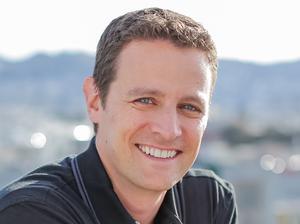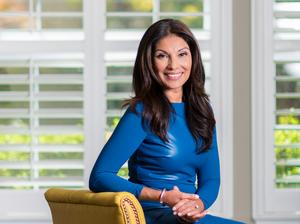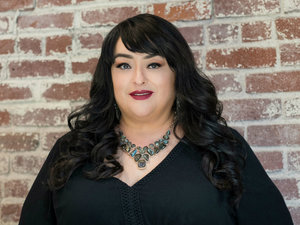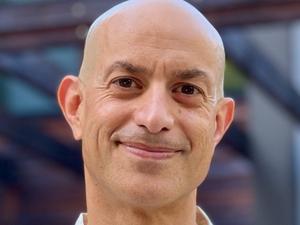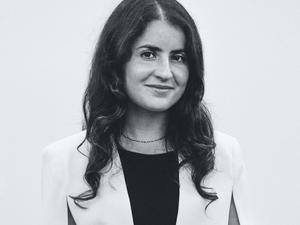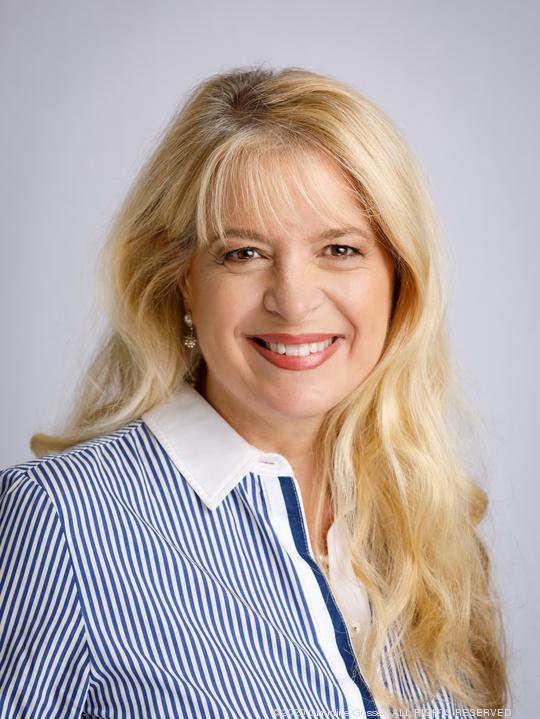
Venture capital firms count very few women on their teams, especially as general partners, but DDx Ventures is flipping that script.
The Menlo Park-based venture firm was founded by Michele Colucci in 2018 to focus on early diagnostics startups, and it boasts a majority-female team. Colucci has an eclectic background. She has studied English, philosophy, law and fine arts; speaks three languages; and has founded companies in industries as varied as law, technology, retail and entertainment. Since 2018, she has been a West Coast Ambassador to the Nobel Laureate Foundation. And in 2019, the firm also launched a fellowship program for college students that has since mentored around 80 students.
Colucci founded DDx Ventures after watching several people in her life go through various health issues, including a couple of friends who didn't survive their late-stage illnesses. One had a 12-year-old daughter whom Colucci then became the legal guardian of while she was already a single mother of three boys. I spoke with Colucci recently about that experience, why early diagnostics is an important field to fund and what it's like to lead a majority female team in a male-dominated industry.
How did you get into investing? You have a really wide ranging background that includes tech, law, retail, entertainment, English and philosophy. I've been a serial entrepreneur my whole life. I have been on the other side of the table and have become acutely aware of the DNA of founders and why companies succeed and why they fail. So, investor was a natural transition for me — and, specifically, the AI data-enabled worlds — because I had previously been in AI and data-enabled legal tech which is a highly regulated industry with objective and subjective data sets and the interplay between those as a way to diagnose and move forward with a situation.
Can you tell me a little bit more about why you wanted to focus on healthcare technology? What really moved me to action was, I had two very close friends who died of late diagnostics, one of whose daughter I added to my family as a single parent of three boys. So I felt very frustrated over the course of all those years dealing with the health care of my children, my parents, my friends, that we would go into a doctor and not be able to come out knowing exactly what's wrong with us.
With all the data we have about our bodies now and the ability to process those billions of data points and find correlations, causally or otherwise, it made no sense that we could not be better or get better at earlier and less invasive methodologies of predicting and diagnosing and monitoring illness.
Can you tell me about DDX ventures? Having a majority-female team is very unusual in venture capital. Was that intentional? Yes, we are about 70% female. It was intentional.
I've raised funds for companies. My former mentor raised the issue in 2011 at J.P. Morgan. When they asked him what was the most unusual or interesting thing he saw about J.P. Morgan, he said there are no women here. When I got into this, I noticed across the board that there were very few women who invested in venture, very few women who raised successfully and very few women who were founders getting funded. There were very few women in the C-suite and very few women on boards. So I decided it was going to be my focus to try to break that chain of exclusion and include more women.
I'm not focused on only women, though. I think there is a huge benefit and reduction of risk in diverse teams. I believe in a diversity of knowledge and experience and expertise. It really evolved organically that we ended up with a majority of women. Not that there aren't great guys out there, they just had more places to go.
It's not that there are no unqualified women, Black women, Latinas. There are qualified people out there, they just don't have the access to those opportunities, right? That's been traditionally the case. I believe that people hire people who are familiar to them. Because for them, they don't have to try and guess what they're thinking. So it's pattern recognition.
Especially coming from another male-dominated field such as law, has there been a noticeable difference working on a female-dominated team? Absolutely. I remember reading something talking about when you're in the boardroom, emanating a woman's point so that a male doesn't take that point as theirs and get credit for it. We don't have to worry about that. We all embrace whoever originates an idea. There is no concern that you need to own it. That's refreshing.
Also, I think that because women are in the minority, they have a greater understanding of the importance of collaboration and mutual support. When I first started, that wasn't the case. Women were very competitive because there were so few slots and they were all fighting for them. The legal world became much easier to break into because of the legalities surrounding not having diversity and the awareness of those issues. In technology, it's a huge issue. And women in finance, I think, are starting to realize there were already those who broke the ceiling. The realization that more is better has come over the last five years. And as a result, I think there's a lot more collaboration and support amongst women investors, women in finance.
There still seem to be a lot of roadblocks. I don't know if it just all boils down to early education, which opens up more opportunities down the road. I think the first part is that they have to start to realize that in order to be part of the wealth creation, not just the wealth inheritance or the wealth by marriage, but in order to be part of the world of wealth creation, you have to get comfortable with a degree of risk.
The second piece is early education because, for instance, in health care, women make 90% of the decisions. If somebody gets sick, guess who's staying home from work? Or giving up our career? Women have a very strong interest in investing in solutions that are going to make their life easier and make the health of their family better.
Then moving from mentorship to advocating. It's one thing to mentor a woman, it's another thing to be their advocate.
You have also incorporated some impact missions into the firm's strategy. Why was that important to you? So what's interesting about impact is that, if that's who you are, it happens naturally. It started organically and then we looked back on all the things we had done and started to look at it with a DEI lens, whether it's how the companies impact diversity in their patient populations, or whether it's our team or whether it's our investors or whether it's our fellowship, and we realized that we were skewed to women and minorities. And then we really dug into why and all the metrics, and realized that's a natural progression. That's something that naturally should occur. Then it became more intentional.
Can you tell me more about the firm's investing strategy? Why are you focused on early detection and minimally invasive solutions that aim to lower costs and improve accessibility? So each one of our pillars — which is earlier, less invasive, less expensive, more accurate, enabled by AI and data — each one of them has a lot of thought put into it. On a high level, the earlier diagnostics enables the chance of survival to skyrocket, as well as the opportunity to skyrocket the savings to the health care system. Our bodies are a big data problem. And given that we are now getting better and better at quantifying, analyzing, predicting, correlating all that data in external, you know, your saliva, your poop, your breath, your skin — all these things that are coming out of our body or on the outside of our body — are telling us what's going on inside. So the ability to do that more accurately with data is huge.
What are you most excited about looking toward 2022? What I am most excited about is we are forever changing the way we diagnose illness, and in the next five to 10 years, I think we are going to be in a world where we get a call from our doctor and they say, "Hey, you should come in, I noticed something" or "hey, you should take this test." It's going to be earlier and predictive, and it's going to be data gathered from signals that we have agreed to allow to be collected but that we are not aware of whether it's your smartwatch or sensors or Alexa or whatever it is that's giving us early indications of things.
We will reduce the amount of serious illness and the amount of spending that's crippling our health care system. And our insurance will go down and our lives will be healthier. There is just no downside. I'm inspired by all the entrepreneurs I see that are coming up with these novel ways in our focus areas, which is essentially the intersection of biology and chemistry and technology.
The Deets
Where do you live? Portola Valley
What are your hobbies? I like to work out. I used to go to the gym a lot. Now I do a lot of walking and go to a lot of meetings. And I love to spend time with my kids.That's what I do in my free time. I'm a single parent. So those are the kinds of things that bring me joy right now. I also spend time working with the Nobel Laureate Foundation and our fellowship program.
What are you reading? "AI 2041: Ten Visions for Our Future" by Kai-Fu Lee and Chen Quifan. And I sometimes go back to "Walden" by Henry David Thoreau and also "Thinking Fast and Slow" by Daniel Kahneman.
What are you watching? Aside from watching sports with my son, which I love, sometimes "Dateline." I like trying to figure out who did what and why and get inside the head of a person. It's fascinating to me from a legal standpoint.
Where did you go to school and what did you study? Law at Georgetown University and fine arts at the American Film Institute. Also studied english and philosophy as an undergraduate.
What was your first investment? Nephrosant, a kidney diagnostics company.
What are you most proud of? By far, my children. They all went through a challenging time with my divorce. And in my daughter's case, the death of her parents. I am most proud of their resilience. And I've always tried to encourage them to embrace whatever their passion is. I don't care what school they choose, I don't care what they want to do. I just care that they have chosen that path. I think that's the secret to contentment which is what I believe is the key to happiness. Gratitude, contentment, those are really important.
